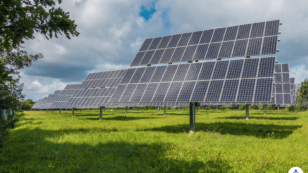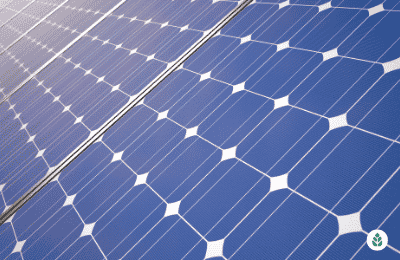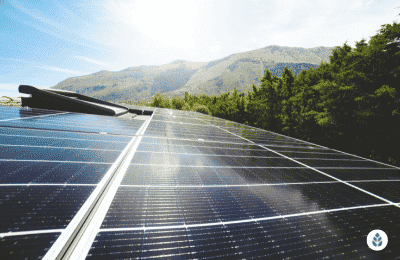 Reviews
Reviews
Is Solar Worth It in Georgia? (2024 Homeowner's Guide)
Here’s a quick overview of solar viability in Georgia:
- Georgia ranks 7th in the country for solar installations.*
- The average electricity rate is 14.36 cents per kilowatt-hour.**
- The average solar payback period is 12 years.***
- Homeowners are eligible for local rebates from individual cities or utility companies and the federal solar investment tax credit (ITC).
- The average homeowner saves $32,443 over the lifetime of their solar system.***
*According to the Solar Energy Industries Association.1
**Data from the Energy Information Administration.2
***Calculated assuming the system is purchased in cash.
Each product and or company featured here has been independently selected by the writer. You can learn more about our review methodology here. If you make a purchase using the links included, we may earn commission.
As one of the closest states to the equator, Georgia receives more sunlight than most other areas in the US, and homeowners enjoy cheaper solar panels compared to the national average. As such, the majority of homeowners in GA find that solar panel installation is a worthwhile investment in the long run. Below, you’ll find several criteria you can use to determine if your home is a good fit for solar conversion. We’ll also discuss the benefits you’ll enjoy when you go solar in Georgia and some critical things to consider as you move through the process of converting.
To speak with an EcoWatch-vetted professional who can help you determine whether solar is worth it for your Georgia home, follow the links below.

Blue Raven Solar
Pros
- Industry-leading in-house financing
- Competitive pricing
- Excellent reputation
Cons
- Doesn't offer solar batteries (coming 2022)

Blue Raven Solar
Pros
- Industry-leading in-house financing
- Competitive pricing
- Excellent reputation
Cons
- Doesn't offer solar batteries (coming 2022)
Watch Below: Learn How Solar Panels Are Becoming So Efficient
How to Figure Out if Solar Panels are Worth It in Georgia
Solar conversion is a worthwhile endeavor for most Georgians, but it’s not guaranteed to save money for every homeowner. Below, we’ll discuss some of the factors that can affect the viability and value of solar panels on your property. You can assess your home based on these criteria to decide if solar is a good fit for you.
What’s Your Home Electricity Consumption?
One of the most important things to understand is that the price of your solar panel system and how valuable your panels will be to you is the amount of energy your home consumes on a monthly basis. You can check your average monthly energy needs on your past energy bills, which should show the previous 6 to 12 months’ worth of energy consumption. A good rule of thumb is that solar panels will be worth the investment for any home that consumes more than 500 kilowatt-hours monthly. The average consumption in Georgia is 1,081 kWh, so the large majority of homeowners in the state will find that solar conversion is worth the investment.
How Much Is It To Go Solar in Georgia?
The price of solar panels in Georgia is typically around $3.29 per watt, making Georgia the ninth most affordable state for solar equipment in the country. With most homeowners in the Peach State requiring a solar capacity of around 11 kW, the average total price to convert to solar is $36,190 or $25,333 after the federal tax credit.
Solar panels provide more value and pay themselves off more quickly in areas where electricity rates are high or energy consumption is above average. Although the per-kWh prices are about average in GA, the average home uses 1,081 kilowatt-hours per month, whereas the national average is 881 kWh. As such, solar will be more valuable in Georgia than in most areas throughout the country.
What’s the Payback Period for Solar in Georgia?

What Are Average Buy-Back Rates in Georgia?
Most state governments have mandated net metering or an energy buy-back program to incentivize homeowners to convert to clean energy. These programs let you produce more energy than you need with your panels and then sell the excess to your utility provider to offset your bills or for profit. Unfortunately, the State of Georgia doesn’t mandate net metering. Some electric companies — like Georgia Power — offer it, but many do not. You should check with yours before signing anything. For many Georgia residents, an ideal net metering program will not be available. Many homeowners instead choose to add a battery pack or system to their home solar project. Solar batteries store excess energy production for personal use, allowing you to offset your electricity rates through the night or on cloudy days when your panels are likely to underproduce. Solar storage will add significantly to your system expense, but it often pays for itself due to the lack of net metering in Georgia.
How Much Sun Does Your Roof Receive?
Solar panels produce energy when they receive direct sunlight, so roofs that get hit with more sun will be a better fit for solar panels. Georgia as a whole experiences 218 sunny days per year, which is more than the national average of 205. As a southern state closer to the equator, Georgia also receives more direct sunlight than many other areas throughout the country. As such, GA is generally a great place for solar conversion. However, your specific property might not be ideal. First, you’ll want to consider the direction your roof faces. South-facing roofs are best for receiving sunlight, while west-facing roofs are far less ideal but still often suitable for panels. You will also need to consider how much shading your roof gets. Shade from trees, buildings or other sunlight obstructions will reduce your total power production capability, making panels less valuable for your home.
What’s the Outlook on Solar in Georgia?
Georgia is one of the few states in the country that almost totally lacks solar incentives. Normally, a lack of incentives means homeowners are slow to adopt solar, but quite the opposite is happening in Georgia, with utility-scale installations accounting for most of the megawatts being installed. Georgia is home to solar panel plants that employ hundreds of workers, so the solar industry is booming in the Peach State despite a lack of statewide incentives. Generally speaking, homeowners in the area are adopting solar more quickly than in many other states, and solar is one of the most favorable renewable energy sources. Residential solar installations have been on the rise over the past decade, and the boom is expected to continue in the future.
Benefits of Solar Energy in Georgia
As mentioned above, there are no statewide solar incentives in Georgia and very few local incentives to entice homeowners to switch. However, solar panels still bring homeowners plenty of upsides throughout the state. We’ll discuss some of the most appealing benefits of going solar in GA below.
Electricity Bill Savings
The most substantial financial benefit of going solar in Georgia is the reduction you’ll see on your utility bills. Most residents pay around $155.23 per month for electricity, which means you could save up to $1,862 per year — although this would likely require a solar battery, given that net metering isn’t mandated in the state. Over the 25+ years your panels are expected to perform, this equates to a total savings of $32,443, and that’s after your panels pay for themselves. Additionally, solar panels make you less reliant on your energy company, so you’ll be able to avoid or at least lessen the blow of spikes in electricity rates for the lifespan of your equipment. Locking in a lower electricity rate will make financial planning and budgeting easier.
Lower Taxes & Access to Other Incentives
Georgia doesn’t have many incentives to push homeowners to convert to solar, but residents still have access to the federal solar investment tax credit (ITC) and some local incentives and rebates.
The ITC is a credit to your federal income taxes in the amount of 30% of your entire expense to go solar. In Georgia, the average ITC amount is $10,857.
Depending on your electric company, you might also be eligible for some solar rebates or energy-efficiency rebates. For example, Jackson EMC provides a rebate for going solar in the amount of $250 for every kilowatt you install or $2,500 total, whichever is less. With the average system size coming in at 11 kilowatts, most customers will qualify for the full $2,500. You can check with your utility company for additional incentives.
Home Resale Value Increase
Many homeowners fail to realize that solar panels increase property value, but in many cases, this perk is more beneficial than energy savings. According to estimates from Zillow, the average home will jump in value by around 4.1% when a solar energy system is installed.3 In Georgia, where the average home value is $319,158, the average value added by a solar panel system will be around $13,085.4
It should be noted that this benefit of going solar is only applicable if you purchase your panels outright or use a financing solution to pay for them. Solar leases and power purchase agreements (PPAs) will not cause your property value to increase, and they may actually create additional expenses if you sell your home, as early termination fees can reach into the thousands of dollars.
Clean, Renewable Energy
Some Georgia homeowners will be more interested in the environmental benefits of solar panels than the financial perks, and there is plenty to say about the eco-friendliness of solar energy. When you install panels, you’ll be reducing your reliance on fossil fuels, which means your carbon footprint will be decreased, as will your contribution to air and water pollution. You will also contribute less to global warming.
Additionally, by making your home more energy independent, you’ll rely less on your utility company, meaning you can avoid electricity rate increases, and solar customers with battery storage can also maintain power through power outages.
What to Look Out For When Considering Solar in Georgia
Some of the heavy lifting on your part will be done once you determine that solar is a worthwhile investment for your home, but there are still quite a few things to consider to ensure the installation process goes smoothly. We’ll discuss some things to look out for when you’re moving forward with installing solar panels in Georgia below.
Upfront Fees

Payback Period
The time it takes you to pay off your panels using the energy savings they afford you is something you’ll want to keep track of throughout your entire experience with solar. You can see how your panels perform in comparison to expectations to budget and plan for when they pay themselves off. After that point, you can estimate your total return on investment, which will inevitably be lower than average if your estimated payback period is longer than 15 years.
Net Metering Policies in Georgia
While net metering isn’t mandated in Georgia, some local utility companies do offer it, so it’s important to check with yours before you commit to going solar. If your provider doesn’t have a net metering policy, you’ll still likely benefit from going solar, but you might want to consider installing a solar battery in your home in addition to the panels. A battery will add quite a bit to your total installation expense, but they often pay for themselves quickly by providing a means of avoiding electricity fees.
Pending Policies & Changes to Incentives
The solar industry has only been around for a few decades, so it’s still expanding and improving throughout the country. In areas like Georgia, where solar incentives and policies are less than ideal, there is plenty of room for growth. As such, policies can change and incentives can be added to make solar even more appealing. While it’s not advisable to wait for better incentives or rebates to pop up, you should check for updates to policies before you begin installing solar panels.
Weather & Climate in Georgia
Solar panels are most valuable nearer the equator and in areas where there is plenty of sun. Georgia is one of the southern-most states and receives an average of 218 sunny days per year, which is above the national average of 205. As such, homes in the area are generally well-suited for solar conversion and will see substantial energy savings.
Some homeowners understandably worry about the effects of above-average precipitation and the frequency of tornadoes in the state. Although most of Georgia gets hit with rainfall that’s well in excess of the national average, the rain actually serves to keep your panels clean, maximizing performance when the sun is shining. While tornadoes can be an issue, choosing a solar panel installation company that provides a good warranty should be enough to quell any major concerns.
Companies Pushing Solar Leases or PPAs
Finally, it’s best to choose your solar installer very carefully, as there are some out there that don’t have your best interests at heart. For example, some companies advertise “free panels,” which aren’t really free at all. This is a marketing ploy to get you to sign a lease.
Leases aren’t nearly as beneficial as solar loans, as they don’t boost your home value, they don’t let you take the federal tax credit and they provide far less financial benefit over time. Unfortunately, some companies are just out there to scam unwitting solar customers. Fox 5 Atlanta reported on several scams where homeowners paid thousands and even tens of thousands upfront and never received panels.5
The Georgia Public Service Commission has also made statements about scam companies that exaggerate savings and falsify incentives to get homeowners to sign leases or power purchase agreements (PPAs).6 Be very careful about the installer you choose and always make sure to work with a vetted and reputable company.
Wrap Up: Is Solar Worth it in Georgia?
Generally speaking, Georgia is a great place to go solar. The state receives more sunshine than most, has cheaper solar equipment than most states and has higher energy consumption than average, making solar worth the investment for most homeowners.
However, solar conversion isn’t right for everyone, so you’ll have to determine if your home is a good candidate for solar panels. To do so, you’ll need to consider quite a few factors, including how much sunlight hits your property, the direction your roof faces, shading on your roof during peak production hours, your estimated panel payback period, and more.
We strongly recommend connecting with a reputable solar installer in your area to help you decide if solar is a good investment for your home.
See also: Find out how much solar power your roof can produce with our solar calculator
Read More About Going Solar
- What Are the Best Solar Companies in Georgia?
- What Georgia Solar Incentives Are Available in 2022?
- How Much Do Solar Panels Cost in Georgia?
The cost information presented in this article is derived from a comprehensive analysis, incorporating data from multiple industry sources. The average cost per watt per state was calculated based on figures from Consumer Affairs, Energy Sage, and Berkeley Lab’s Electricity Markets & Policy Department. Additionally, monthly energy consumption and the average monthly cost of electricity were sourced from the U.S. Energy Information Administration, ensuring a well-rounded and accurate representation of the information presented.
Frequently Asked Questions
The EcoWatch team frequently gets questions from Georgia homeowners about the value of solar in their area and how to determine if conversion is right for them. Below are some of the questions we see most often, along with our responses. If you have specific questions that aren’t answered here, reach out to our team of solar experts at solar@ecowatch.com.
The solar panel payback period will be different for every homeowner, but the average time frame in Georgia is around 12 years, which matches the national average. Most homeowners in the state will pay off their installation expenses with energy savings between 9 and 15 years. To determine your payback period, you’ll need to consider many factors, including the direction your roof faces, shading on your home, your monthly energy needs, the net metering policy offered by your power company, and more. The best way to estimate your payback period is to have a local solar installer calculate it for you.
In most cases, yes. Georgians can save around $32,443, on average, which is the energy savings you’ll enjoy after your panels pay for themselves. It should be noted that a solar battery will likely be required to maximize savings if your utility provider doesn’t have a net metering policy.
Yes! According to estimates from Zillow, homes that have solar power systems installed are worth about 4.1% more than homes that don’t. In Georgia, this means the average bump in value enjoyed when panels are installed is around $13,085. It should be noted that Georgia does not offer a solar property tax exemption, so your property taxes will go up in addition to your home value.
Yes, permits are required for solar panel installation in Georgia, as is the case in all other states. Permits help provide you with a safe panel installation, so while they add to your total expense, they’re worth the investment. Your solar installer should be able to handle the permitting process for you.
You can technically install your own solar panels in Georgia, but it’s not recommended. Putting in a rooftop solar system is dangerous and very time-consuming, so it’s often worth it to pay a professional to do the work for you.
Top Solar Installers in Georgia Cities
Comparing authorized solar partners
-
- Industry-leading in-house financing
- Competitive pricing
- Excellent reputation
- Doesn't offer solar batteries (coming 2022)
A+Best Solar Financing2014Trina Solar, Canadian Solar, SolarEdge, Silfab, SunPower25-year manufacturer warranty; 10-year workmanship warranty, 2-year production guarantee
Having trouble deciding? Click below and use our process to receive multiple quotes instead:

 233k
233k  41k
41k  Subscribe
Subscribe 







